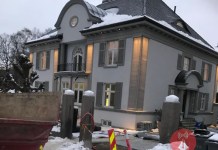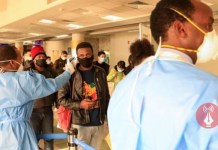37 Military Hospital, Ghana’s premier military Hospital and referral center is in the news for allegedly demanding payment after its doctors negligently got a patient killed.
A brother of the victim who has traveled down from the US is crusading for an end to notorious negligence in Ghanaian hospitals and has been telling the harrowing story of how his sibling was deprived of oxygen while in the Intensive Care Unit because a nurse had unthinkingly connected oxygen tubes into his skin rather than his windpipe.
Mr. Emmanuel Asare-Kumah, recalls how his 42 year old brother was puffed up with air from the improper connection of oxygen tubes and left to die while nurses and doctors went about their normal duties.
And this sibling, who was neglectfully killed by the hospital suffered such fate even after the family had forked out almost ghc70,000 in medical bills. What is even annoying the family the most is that the same hospital which killed the victim is demanding that the family pays extra money before they can receive his corpse.
The 37 Military Hospital, Emmanuel Asare-Kumah says, is actually conjuring phantom services that it claimed it had rendered in the lead up to the wrongful death of the victim.
The victim was said to have fallen sick months back and had first been admitted to the C&J Hospital at Adabraka, but was referred to the 37 Military Hospital. After initial assessment, a neurosurgeon, Dr. Col. Appiah, had diagnosed brain tumour and ordered an emergency surgery.
However, the same Dr. Appiah had told the family of the patient that there is a long waiting list for surgeries and that in order for the emergency surgery to be carried out on the patient, he had to be jumped. That jump was going to cost the family Ghc40,000.
A down payment of Ghc25,000 was quickly made to clear the way for the surgery, however, after the doctor had received the money, he went into a long spell of postponements.
Two weeks of not operating on the patient under all manner of excuses, including at a point, the doctors claim that he himself was sick, it finally came to time send the patient to the operating theatre for the surgery. However, after Dr. Col. Appiah had administered anesthesia, he returned to the family to report that he did not have a drilling machine and would need to import some from South Africa.
The doctor also reportedly said he did not have surgical glue, prompting the family to import some from the US. Getting these things ready took another week, so that by the time that Dr. Col. Appiah was ready to operate, a month had elapsed.
Eventually, after 8 hours in the btheatre, the doctor emerged and reported that the drill that he had imported from South Africa had broken down mid way into surgery and so he had to suture up the skull he had opened and bring the patient back to the ward.
According to Mr. Emmanuel Asare-Kumah, not long after the return from the theatre, they realized that his brother’s leg had swollen. And because 37 Military Hospital’s CT scan was not working they had put him in an ambulance and drive him to a private hospital twice for CT scan.
The scan return with a diagnosis of deep vein thrombosis and so the patient had to be driven to the Korle Bu teaching hospital’s cardiothoracic center for a procedure. That cost the family US$5,500.
After the procedure, he narrates, his brother had become a bit better and could at least communicate. He was sent to the theatre again at 37. because of the delays, he had had to be put in the Intensive Care Unit of 37 to recover.
Mr. Asare Kumah explains that even after the surgery, nobody knew wheteher it was successful because of the broken down CT scan at the hospital – no scan could be conducted into his brain to see if the operation had been perfect.
Then while recovering in ICU, it became his brother to breathe and so he had to be put on life support. Even under that machine, his breathing was a problem and so the doctors had to make an incision in his throat to connect tubes from an oxygen machine. This was to become the instrument of his killing.
One evening, the tubes had collected phlegm and saliva and so had to be cleaned. Whoever disconnected it to do the cleaning, forgot to fix the tubes back into his windpipe after doing the cleaning, rather connecting the tube into his skin.
The misdirected oxygen puffed the patient up causing him to be distended like a balloon before he died. However, the same hospital would later tell the family that the victim had suffered cardiac arrest.
But the part of the story that has got many people angry is that 37 is demanding that the family pay up bills that they had accumulated in the cause of the admission, and that the hospital is conjuring services that it did not render and demanding payments for them.
A livid Mr. Asare-Kumah tells of how even the services that were rendered were so poor, that even ten pints of blood that his brother needed would be handed to him in his bear hands after he had taken it for testing but would be delayed in long queues, so that by the time he submitted the blood to be administered to his brother, he would be told that the blood had clotted.













